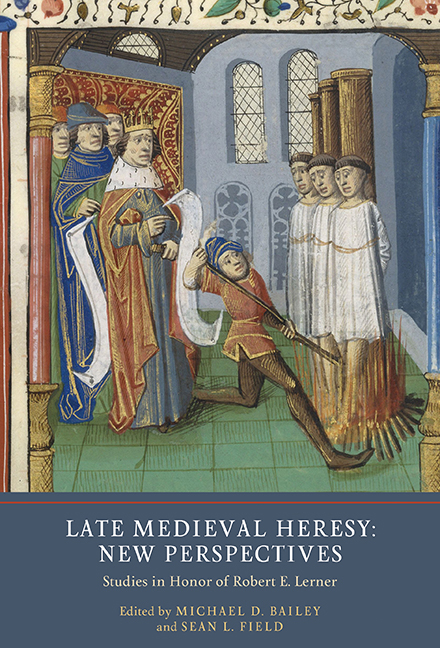Book contents
- Frontmatter
- Contents
- Preface: Robert E. Lerner: A Portrait
- List of Contributors
- Introduction: Historiography, Methodology, and Manuscripts: Robert E. Lerner and the Study of Late Medieval Heresy
- 1 The Heresy of the Templars and the Dream of a French Inquisition
- 2 The Dissemination of Barthélemy Sicard's Postilla super Danielem
- 3 Magic, Mysticism, and Heresy in the Early Fourteenth Century
- 4 The Making of a Heretic: Pope John XXII's Campaign against Louis of Bavaria
- 5 Unusual Choices: The Unique Heresy of Limoux Negre
- 6 Princely Poverty: Louis of Durazzo, Dynastic Politics, and Heresy in Fourteenth-Century Naples
- 7 Disentangling Heretics, Jews, and Muslims: Imagining Infidels in Late Medieval Pastoral Manuals
- 8 New Frontiers in the Late Medieval Reception of a Heretical Text: The Implications of Two New Latin Copies of Marguerite Porete's Mirror of Simple Souls
- 9 Disputing Prophetic Thought: The 1466 Questio quodlibetalis of Johannes of Dorsten
- 10 Heretics, Allies, Exemplary Christians: Latin Views of Ethiopian Orthodox in the Late Middle Ages
- 11 ‘By them in reality I meant the Jews’: Medieval Heretics in the Work and Life of Renate Riemeck (1920–2003)
- Afterword: Who or What Was a Heretic in the Late Middle Ages?
- Robert E. Lerner: A Chronological Bibliography
- Index
- York Medieval Press: Publications
9 - Disputing Prophetic Thought: The 1466 Questio quodlibetalis of Johannes of Dorsten
Published online by Cambridge University Press: 14 June 2019
- Frontmatter
- Contents
- Preface: Robert E. Lerner: A Portrait
- List of Contributors
- Introduction: Historiography, Methodology, and Manuscripts: Robert E. Lerner and the Study of Late Medieval Heresy
- 1 The Heresy of the Templars and the Dream of a French Inquisition
- 2 The Dissemination of Barthélemy Sicard's Postilla super Danielem
- 3 Magic, Mysticism, and Heresy in the Early Fourteenth Century
- 4 The Making of a Heretic: Pope John XXII's Campaign against Louis of Bavaria
- 5 Unusual Choices: The Unique Heresy of Limoux Negre
- 6 Princely Poverty: Louis of Durazzo, Dynastic Politics, and Heresy in Fourteenth-Century Naples
- 7 Disentangling Heretics, Jews, and Muslims: Imagining Infidels in Late Medieval Pastoral Manuals
- 8 New Frontiers in the Late Medieval Reception of a Heretical Text: The Implications of Two New Latin Copies of Marguerite Porete's Mirror of Simple Souls
- 9 Disputing Prophetic Thought: The 1466 Questio quodlibetalis of Johannes of Dorsten
- 10 Heretics, Allies, Exemplary Christians: Latin Views of Ethiopian Orthodox in the Late Middle Ages
- 11 ‘By them in reality I meant the Jews’: Medieval Heretics in the Work and Life of Renate Riemeck (1920–2003)
- Afterword: Who or What Was a Heretic in the Late Middle Ages?
- Robert E. Lerner: A Chronological Bibliography
- Index
- York Medieval Press: Publications
Summary
In August of 1466, the Augustinian Hermit and doctor of theology Johannes Bauer of Dorsten delivered a public questio quodlibetalis at the University of Erfurt. Each year a member of the faculty was chosen as dominus quodlibetarius to engage a question of general interest, and the ensuing public discussion was meant to establish the orthodox answer to the question posed and to showcase the erudition of the lecturer. The spoken questio was afterward expanded in writing. As Christopher David Schabel has noted, ‘in many cases the questions deal with current events and as such have precise historical significance both for the information they provide and for the perspectives of major thinkers with respect to such events’. Dorsten's questio was a case in point, because it addressed an unorthodox topic of local, contemporary interest.
The question which Dorsten posed was ‘Whether the Third Status Envisioned by Joachim of Fiore and Extrapolated by the Conventicle of Heretics … will arrive in 1471?’ He introduced the topic by explaining, ‘In these days … some dangerous and poisonous heretics have emerged from their lairs and vomited forth the venom of their errors into the Church of God, namely that the Third Status will come before 1471, eradicating the New Testament’. With such a scandalous subject, this promised to be an engaging lecture.
It would be nice to know who chose the topic of Dorsten's questio. Ludwig Meier suggests that since Dorsten was not a member of the arts faculty (he was on the theological faculty), there would have been no pre-assigned question, ‘and therefore we may assume that the topic and its formulation comes from Dorsten himself, but perhaps through a previously posed student question’. Meier speculates that the topic of the questio could have been a spontaneous reaction to current events, which is certainly possible. As I will discuss below, there were in fact heretics not too far away disseminating predictions for the year 1471 – although they were not quite as Dorsten described them. These heretics were the Wirsberger brothers, Livin and Janko, who were members of the lower nobility from the area of Eger (now the Czech city of Cheb).
- Type
- Chapter
- Information
- Late Medieval Heresy: New PerspectivesStudies in Honor of Robert E. Lerner, pp. 178 - 194Publisher: Boydell & BrewerPrint publication year: 2018

